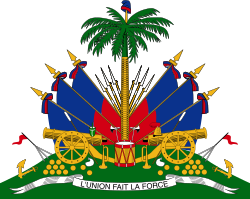| |||||||||||||||||
Presidential election | |||||||||||||||||
| |||||||||||||||||
| |||||||||||||||||
 |
|---|
General elections were held in Haiti on 8 October 1950 to elect the president and members of the Senate and Chamber of Deputies. [1] For the first time in history, the presidency was elected by public vote rather than by members of the Chamber of Deputies. The presidential term was set at six years with no possibility of extension or immediate re-election.
Paul Magloire was the only candidate in the presidential election, and was elected unopposed running under the Peasant Worker Movement banner. [2]
